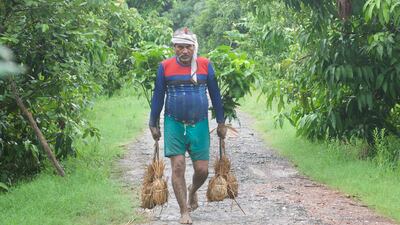“It is a tree, an orchard and the world’s most unique research institute – all in one,” says Kaleemullah Khan proudly as he points towards an expansive 125-year-old mango tree laden with the fruits of his hard work.
Mr Khan, an 83-year-old self-taught horticulturist, has over the decades grown about 300 varieties of mango from the “mother tree” in his 5.6-hectare orchard in Malihabad in Uttar Pradesh, India.
The 9-metre tree has a stout trunk and thick branches spread like a giant aloe vera, with leaves of various textures and colours from light green to yellow – and almost all its branches laden with fruits of different colour, size, taste and smell.
“I am obsessed with mangoes. You see all these fruits, they’re all different from one another, just like humans. All different. They look different, they taste different and they smell different,” Mr Khan told The National.
“I think about mangoes all the time. My heart and brain are into mangoes. I feel happy, playful, excited around them,” he says, pointing at the mangoes with his walking cane.
“You collect all types of fragrances in the world but a mango’s aroma would beat them all. Similarly, you try all the tasty foods in the world but mango’s taste would be supreme.”
For his work, the octogenarian has earned the moniker of India’s “Mango Man”.











Self-taught scientist
India, home to about 1,000 varieties, is the largest mango producer in the world, with production last year estimated to be 21 million tonnes.
Uttar Pradesh is the largest mango-producing state in the country, with four million tonnes every year.
Mr Khan was born into a family of farmers who grew mangoes and other fruits in the tiny hamlet of Malihabad, known for its mango plantation.
After dropping out of school at age of 10, Mr Khan never received a formal education or qualification in horticulture.
But his passion drove him to grow new varieties of the fruit.
At 17, he was struck with the idea of growing a variety of mangoes on a single tree.
He initially experimented with growing seven types of mango on the tree that his grandfather had planted in the orchard.
“But the tree failed to grow fruit and was hit by a storm and dried,” he says. “I was devastated but did not lose hope.
“In 1987, I started working again and managed to grow about 35 varieties of mangoes by 1991. Now, the tree gives us more than 300 types.”
Mr Khan uses the grafting method where he diligently slices a branch from one variety, leaves an open wound into which a branch from another variety is spliced and sealed with plastic tape.
“I am gifted. I can grow mangoes even in a desert and in a barren land,” he says.
He has given imaginative names to his mangoes.
A bright red version is named Husn-e-Ara, meaning “adorning beauty”, while a heart-shaped fruit is called Asl-ul-Muqarrar, loosely translated to “genuinely fixed”.
There is also a mango called Makkhan, named after its buttery texture, and Khas-ul-Khas, meaning “the most special”. It has less fibre and a sweet fragrance.
He has also named his mangoes after celebrities, including legendary cricketer Sachin Tendulkar, actress and former Miss World Aishwarya Rai and Prime Minister Narendra Modi.
Mr Khan has now grown a new variety of mango – a cross between the melt-in-the-mouth Dasheri and a red mango called Sinduri for its vermilion-like colour – and named it after himself, Kaleem mango.
“It is a beautiful mango. It has the taste of Dasheri and the colour of Sinduri. I am hoping that this mango will reach different parts of the world and people will get the best of two mangoes.”

Mango's medicinal value
Mr Khan’s passion has earned him national and international fame and recognition.
He was awarded Padma Shri, the highest civilian award, in 2008 and received awards from Malaysia and Kuwait.
He wants to promote the fruit among young people across the world.
“I am worried about the future of mangoes,” he said. “The way our population is growing there is going to be a crunch for space. Orchards and farmlands are being converted into human settlements.
“My aim is to make Indian mangoes famous around the world. I want to grow delicious, tasty mangoes.”
Mr Khan’s other objective is to focus on popularising the medicinal use of mango trees after extracting “tree blood” from them.

He says a concoction of flower extracts and sap from the mango tree can cure illnesses from body pain to heart disease.
He says: “I worked for four years on this. I started in 2008 and in 2012, I managed to extract blood [the red sap] from the tree. Mangoes have natural medicinal value.
“This tree has ‘blood’, which can treat impotence and heart disease. I want this blood to be used for medicinal purposes.”
